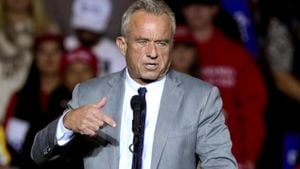The 29th United Nations Climate Change Conference, COP29, has commenced its pivotal discussions from November 11 to 22, 2024, under the auspices of Azerbaijan. This gathering marks another significant chapter in humanity's fight against climate change, with global leaders now facing the stark reality of climate impacts head-on.
UN Secretary-General António Guterres opened the event with a clear message, highlighting the urgency of immediate action. He warned delegates about the dire consequences of climate change, emphasizing, "The sound you hear is the ticking clock; we are on the road to ruin." With 2024 projected to be the hottest year on record, Guterres reiterated the need for ambitious climate action and commended recent steps toward increasing the global reliance on renewable energy sources.
Critically, COP29 is being referred to as the 'Finance COP,' as funding to combat climate change is high on its agenda. Developing nations are advocating for at least $1 trillion annually to address their climate-related challenges—this figure far exceeds previous pledges. Since the initial commitment of $100 billion made by developed countries in 2009 remains largely unfulfilled, the urgency for new financing solutions is palpable.
Discussions at COP29 will need to navigate the turbulent waters of climate finance where old promises became mired in bureaucratic hesitance. Former initiatives have left developing countries feeling neglected, with many still grappling with the effects of extreme weather events triggering loss and damage. The UN has introduced the Loss and Damage Fund to fill this gap, but critics argue it still lacks sufficient resources.
While Azerbaijan's hosting of the conference has drawn skepticism due to its track record on human rights and political freedom, the focus remains steadfast on tangible outcomes. Hazards associated with climate disasters—floods, wildfires, and droughts—call for serious commitment rather than merely performative promises.
Despite underlying tensions related to financing and developed countries' fossil fuel dependency, there's optimism surrounding initiatives aimed at fostering clean energy transitions and collaborative frameworks for financing. Addressing adaptation strategies is also pivotal, as the gap between current adaptation financing and the rising need is becoming painfully evident. Guterres noted the necessity for doubling climate adaptation finance to $40 billion annually by 2025.
The dynamics of the global leadership presence at COP29 have also stirred discussions, particularly with significant players such as China and the U.S., led by President-elect Donald Trump, potentially sidelining the negotiating table. Guterres urged countries to adopt emergency emission reduction strategies, advocating for cutting emissions by 43% from 2019 levels by 2030.
At COP29, the potential of carbon markets presents both opportunities and pitfalls. Nations have agreed to finalize new rules concerning fair carbon market engagements, emphasizing the need to avoid greenwashing initiatives and exploitation of impoverished communities. The principles of transparency and equity must underpin these new market frameworks if they are to lead to real solutions.
Interestingly, discussions have revealed contrasting stances on fossil fuel reliance between developed and developing nations, with income disparities exasperated by climate disasters. Addressing the loss faced by these vulnerable communities—especially as highlighted during extreme weather events—demands urgent recalibration of financial aid policies and commitments from wealthier nations.
Notably, Guterres urged leaders, stating, “Climate finance is not charity; it’s an investment,” signaling a shift away from viewing financial aid solely as goodwill gestures. He insisted on the imperative of climate action across all sectors, reminding participants of the shared responsibility to mitigate the impacts of the climate crisis.
COP29 stands to be transformative, representing not merely bureaucratic talks but potential grassroots empowerment for millions impacted by climate change. If negotiations succeed, they could fundamentally alter the course of international climate policy, ushering back hope and accountability for ambitious climate action.



